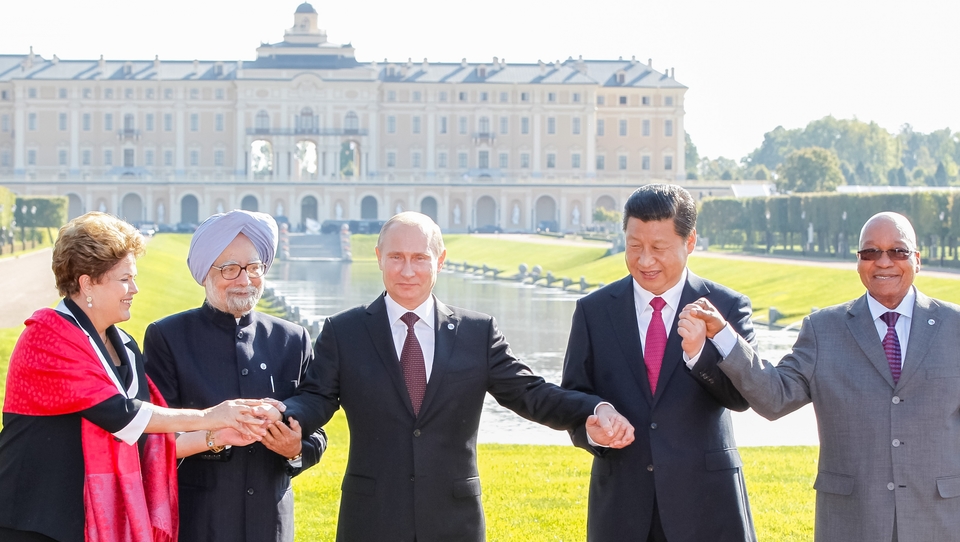
Today I participated in the 3rd roundtable on “Brazil, the BRICS and the International Agenda”, organized by the Alexandre de Gusmão Foundation (FUNAG), an institution tied to Itamaraty, Brazil’s foreign ministry. After a first encounter in December 2011 and a second meeting in April 2012, this was the concluding debate about how Brazil should position itself vis-à-vis the BRICS. The papers written by its participants were published as a book earlier this year. All in all, the discussions represented a remarkable effort by the Foreign Ministry to engage academics and policy analysts.
Contrary to the first two meetings, today FUNAG had invited a series of international analysts to present their points of view. While Prof. Fyodor Lukyanov, Editor of ‘Russia in Global Affairs’ (a leading foreign policy journal in Russia) and Renmin University’s Jin Canrong were hopeful that the BRICS could deepen their colaboration, Prof. Varun Sahni of Jawaharlal Nehru University (JNU) painted a rather negative picture of the potential for intra-BRICS cooperation. While not doubting the usefulness of the outfit in principle, he pointed to many common critiques of the BRICS grouping such as its contradicting interests regarding UN Security Council Reform.
However, his argument that the BRICS had no political future because they were invited by Goldman Sachs as an investment category is debatable: Particularly after South Africa’s inclusion, the BRICS’ member countries have long assumed ownership of the group. Other functional outfits have transformed into something never intended by their founders – NATO, for example, was designed to contain the Soviet Union, yet the alliance is very much alive today, two decades after the end of the Cold War.
Elizabeth Siduropolous of the South African Institute of International Affairs (SAIIA) underlined how much South Africa had benefitted from its inclusion in the BRICS, helping it face many global issues and become a more active international player. At the same time, she expressed hope that South Africa could benefit from the creation of a BRICS Development Bank – an initiative that has been a major topic during the 4th BRICS Summit in Delhi earlier this year.
While this particular encounter may not necessarily be representative of the global debate about the BRICS within the member countries’ societies, there seems to be a striking disconnect between pragmatic, forward-looking at and times visionary policy makers and hesitant academics. Most initiatives (such as currency swaps, the BRICS Development Bank, visa-waiver agreements, and stronger cooperation of the BRICS at the G20) are the result of ideas generated within foreign ministries, not in universities. Valdemar Carneiro Leão, Brazil’s ‘sherpa’ during the recent BRICS Summit, along with other Brazilian policy makers, presented by far the most original ideas during today’s debate. For example, as Fernando Pimentel of Brazil’s Ministry of Finance pointed out, “the BRICS group is a recognized bloc and they are a political reality within the G20 and the IMF”. Paulo Nogueira Batista Junior, Brazil’s representative at the IMF, mentioned that recently Timothy Geithner had asked for permission to participate in one of the regular meetings of BRICS member countries’ IMF representatives.
This points to a necessity for the BRICS’ governments to convince their respective societies of the BRICS’ usefulness. At the same time, it also reveals shortcomings among Brazil’s, India’s China’s, Russia’s and South Africa’s academics and policy analysts who have often been unable to accompany the governments’ progress on the matter. As Valdemar Carneiro Leão correctly put it, “the question is no longer whether the BRICS outfit is useful or not. Member governments have decided long ago that it is useful.” Academics should now focus on what can be done to make its summits, working groups and debates more beneficial for all its members.
Read also:
BRICS: What’s in it for Brazil?
Book review: “Brazil, the BRICS and the International Agenda”
Emerging Powers and the Responsibility to Protect
Photo credit: Reuters








